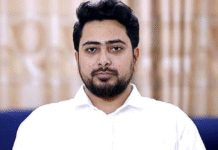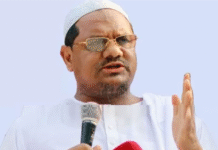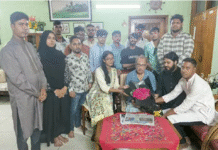A roundtable organised by opposition Bangladesh Nationalist Party on Sunday rejected prime minister Sheikh Hasina’s proposal, placed in UN General Assembly, for ‘safe zones’ for Rohingyas who entered Bangladesh fleeing atrocities by Myanmar security forces that began on August 25.
The roundtable demanded that Bangladesh should recognise the Rohingyas, who took shelter in Bangladesh, as refugees.
It also recommended that Myanmar should be pressured for a permanent solution to Rohingya crisis through their return to their homeland, Rakhine state of Myanmar.
The roundtable on ‘Genocide in Myanmar and the role of Bangladesh’ called for a national unity for facing and solving the current Rohingya crisis.
It asked the government to carry out appropriate diplomatic efforts in international arena including at the United Nations to mount pressure on Myanmar to take back Rohingyas with dignity and respect ensuring their citizenship.
It also urged to solve the crisis in light of the repatriation agreements made during the BNP governments led by late president Ziaur Rahman in 1978 and the rule of BNP led by then prime minister Khaleda Zia.
BNP standing committee member Khandaker Mosharraf Hossain read out the recommendations of the roundtable held at Lakeshore Hotel in Dhaka.
He said that safe zone would be dangerous, harmful, horrible and against the interest for Bangladesh and Rohingyas.
The term ‘safe zone’ should not further be discussed, he said, alleging that it was a ‘conspiratorial’ term.
On Friday, prime minister Sheikh Hasina, during delivering the country statement at the 72nd UN General Assembly, put forward five-point proposals for resolving Rohingya crisis, including set up of safe zones inside Myanmar under the UN supervision for security of citizens of Myanmar irrespective of religion and ethnicity.
At the roundtable, speakers criticised Hasina’s proposals, her refusal to sit or forge unity with BNP, the government’s ‘weak stance’ in dealing with Rohingya crisis.
The roundtable presided over by BNP secretary general Mirza Fakhrul Islam Alamgir was attended by political leaders, professionals and foreign diplomats stationed in Dhaka.
Diplomats from United Nations, European Union, the United States of America, United Kingdom, Canada, Australia, Netherlands, Spain, Pakistan, Maldives and Nepal, among others, attended the roundtable, according to BNP.
Diplomats of China, Russia and India were not present.
Reading out the keynote paper, former ambassador M Serajul Islam said that the Rohingya genocide and ethnic cleansing concerned all Bangladeshis in a manner that other countries might not fully understand.
Referring to Bangladesh independence by people united fight against genocide, he said the plight of the Rohingyas is for all Bangladeshis a national issue it reminds them of their predicament in 1971.
Serajul said Bangladesh had not just failed to expose the systematic genocide and ethnic cleansing that was a national failure in recent times.
Fakhrul Islam Alamgir said that it was internationally recognised that Myanmar in a planned way launched the genocide to annihilate Rohingyas.
BNP standing committee member Amir Khosru Mahmud Chowdhury criticised Hasina’s proposal for implementation of Kofi Annan report, saying that the word ‘Rohingya’ was not mentioned in the report.
Nagorik Oikya convenor Mahmudur Rahman Manna said that the government should be asked to convene an all-party conference on the issue.
BNP as major political party should take political programme to put pressure both on Bangladesh government and Myanmar government and international forum to resolve the crisis.
Human Rights activist Elina Khan urged BNP to form a committee to go various international forums to create opinion for resolving the crisis.
Dhaka University professor Asif Nazrul said that in the present context of global politics, Bangladesh should demonstrate the strength of the state.
BNP leaders Mahbubur Rahman, Abdul Moyeen Khan, M Morshed Khan, Zainul Abedin, Reaz Rahman and Sukomol Barua, former Bangladesh Bank governor Salehuddin Ahmed, economist Mahbub Ullah, political scientist Dilara Chowdhury and former ambassador Mahmud Hasan, among others, took part in the discussion moderated by senior journalist Mahfuz Ullah.
Source: New Age









